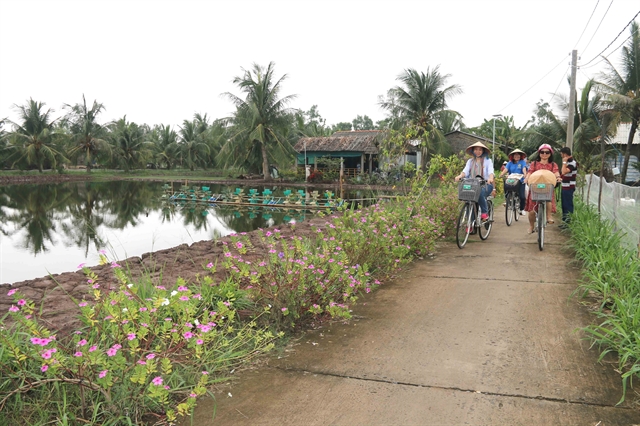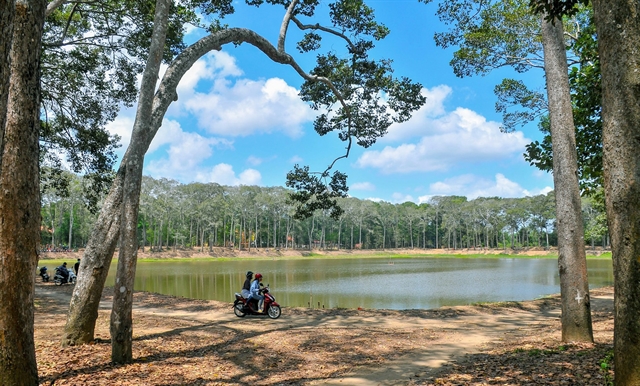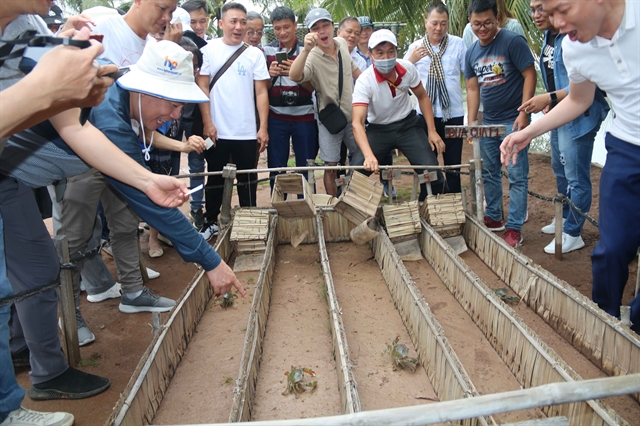The Mekong Delta province of Tra Vinh is developing more nature-based tourism products and new-style rural areas to attract tourists and improve local incomes.

Tourists ride bicycles on Con Chim Island in Tra Vinh Province. — VNA/VNS Photo Thanh Hoa
With a coastline of 65km and its location between the Tien and Hau rivers, two main tributaries of the Mekong, the province has diverse natural tourism resources besides cultural attractions.
It has many riverine islands with orchards offering year round harvests and friendly local people, ideal for developing eco-tourism.
It also has large Hoa and Khmer ethnic minority populations, whose cultures are major attractions.
There are many popular tourism destinations like Ba Om Lake and Ang Pagoda Complex in Tra Vinh City, a 700ha eco-tourism mangrove forest in Duyen Hai District and Tan Quy Island in Cau Ke District.
Ba Om Lake and Ang Pagoda were recognised as national cultural and historic heritages in 1994.

Ba Om Lake is a popular destination in the province. — Photo thamhiemmekong.com
Tra Vinh City is well known for its high rate of urban greenery, with more than 14,000 trees aged hundreds of years old planted along its streets.
Le Thanh Binh, vice chairman of the province People’s Committee, said besides existing attractions, the province has also been developing ecological, cultural and community-based tourism products in recent years.
Con Chim Island in Chau Thanh District’s Hoa Minh Commune, for instance, began to offer nature tourism in 2019.
Here visitors can try their hand at traditional games and cooking local specialities, walk in fruit orchards, row boats, and catch crab, shrimp and fish.
It is situated in the Co Chien River, has a total area of 64ha and 54 households, some of whom offer homestay services.
Half of its farmlands are used to grow rice and vegetables, and fruit trees are grown on the rest. Farmers grow clean produce without using pesticides and other chemicals.
Pham Van Phu, a representative of Theme Travel, a HCM City-based company, said he had visited Con Chim three times and enjoyed its fresh air, tranquility and friendly locals.
He said he was impressed with local people’s high awareness of environmental protection.
His company had included the island into its tours in Tra Vinh, he added.
Vo Van Be, whose household on the island offers tourism services, said, “Farming rice and shrimp cold earn an income of VND10-20 million (US$430-860) a year, while tourism services bring in VND30-50 million ($1,300-2,100).”
Le Van Tri, secretary of the Hoa Minh Commune Party Committee, said: “After Con Chim Island began tourism services, the lives of the islanders have improved significantly because many locals have better jobs.”
The island had received more than 22,000 visitors in the two years since it began offering tourism services, he said.
The average income of people on the island increased to VND60 million ($2,600) last year, or VND13 million ($560) higher than in 2019.
According to vice chairman Binh, tourism and the programme to build new style rural areas are the province’s two major missions, and they positively impact each other.
The programme improves the look of rural areas, lifestyles and infrastructure, and these help develop tourism, while tourism helps improve new-style rural areas by increasing incomes.
Duong Hoang Sum, director of the province Department of Culture, Sports and Tourism, said to further develop tourism, the province is spending VND12.8 billion ($550,000) in 2021-22 on promotional activities within the country and abroad.
It is soliciting investment in a number of tourism projects, including Ba Dong Beach and a farm for eco-tourism in Duyen Hai Town, ethnic Khmer culture-tourism village in Tra Vinh City and Chau Thanh District.

Tourists watch a crab race on Con Chim Island in Tra Vinh Province. — VNA/VNS Photo Thanh Hoa